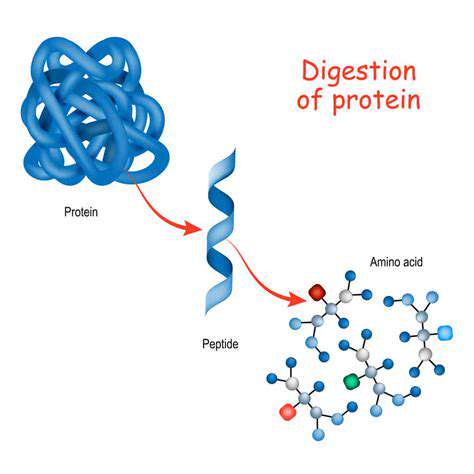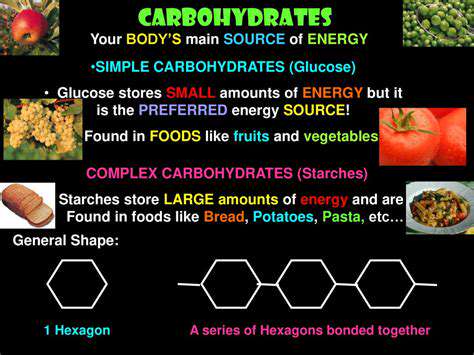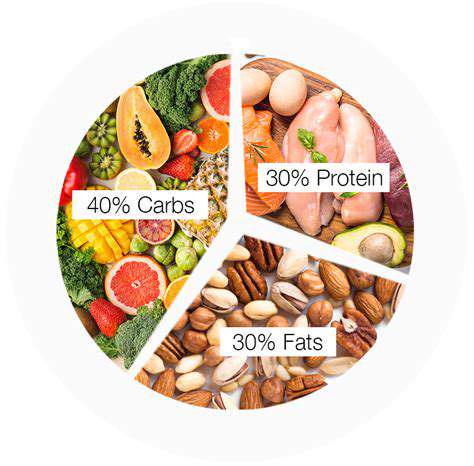Guide to Understanding Macronutrients (Protein, Carbs, Fat)

Understanding the Importance of Protein
Proteins serve as indispensable macromolecules that underpin almost every physiological process. These molecular workhorses form the foundational components of tissues, organs, and cells, shaping both structure and function within our bodies. Whether facilitating muscle development or enabling oxygen transport via the circulatory system, proteins participate in countless survival-critical operations. Grasping their diverse functions proves essential for sustaining peak health.
The biological process of protein synthesis, where amino acids assemble into functional proteins, represents a sophisticated mechanism fundamental to life. This intricate system allows for tissue repair, enzyme production, and hormone creation. Additionally, proteins bolster immune responses, helping combat pathogens and infections. Inadequate protein consumption severely impairs these vital biological processes.
Protein Diversity and Functional Specialization
The protein world showcases incredible structural and functional variety. Collagen exemplifies structural proteins that reinforce connective tissues, while actin and myosin demonstrate contractile proteins enabling muscular activity. Hemoglobin serves as a transport protein shuttling oxygen through blood vessels, whereas enzymatic proteins accelerate biochemical reactions governing metabolism.
Nutritional Protein Requirements
Daily protein needs fluctuate based on age, physical activity, and health status. Satisfying these requirements proves critical for tissue maintenance, muscular development, and overall physiological performance. A varied diet incorporating lean meats, seafood, legumes, and nuts helps ensure sufficient protein consumption. Protein deficiency can trigger multiple health complications ranging from muscle atrophy to impaired immunity.
Selecting Quality Protein Sources
Prioritizing high-grade protein sources optimizes nutritional benefits. Animal products like eggs, fish, and poultry supply complete proteins containing all essential amino acids. Plant-based alternatives including lentils, beans, and tofu also offer valuable protein content, though combining different sources helps achieve complete amino acid profiles. Those following specialized diets, particularly vegetarians and vegans, should carefully monitor their protein consumption and diversify their plant protein selections. Seeking guidance from nutrition professionals ensures personalized dietary planning.

Fats: The Essential Macronutrient
Fat Varieties and Biological Roles
While all fats contribute to bodily functions, their health impacts vary significantly. Recognizing distinct fat categories and their physiological roles informs healthier dietary choices. Saturated fats, commonly present in dairy and red meat, maintain solid states at room temperature. Though necessary for cellular function and hormone synthesis, excessive consumption may elevate cholesterol levels and cardiovascular risks. Contrarily, unsaturated fats from plant sources like olives, nuts, and avocados typically remain liquid and promote heart health by reducing harmful cholesterol. Artificially hydrogenated trans fats present the least healthy option, strongly correlating with cardiovascular diseases.
Essential fatty acids (EFAs), including omega-3 and omega-6 varieties, represent indispensable unsaturated fats the body cannot synthesize independently. These nutrients support cellular development, cognitive function, and inflammatory responses. Omega-3 fatty acids, abundant in seafood and flaxseeds, particularly benefit cardiovascular and neurological health, while omega-6s predominate in various vegetable oils. Maintaining proper omega-3 to omega-6 ratios remains crucial for health optimization, though research continues to refine recommended proportions.
Fats as Energy Resources
Fats serve as concentrated energy reservoirs, offering more than double the caloric density of carbohydrates or proteins. During energy demand, the body metabolizes stored fats through distinct biochemical pathways that provide prolonged energy release. This gradual energy liberation becomes especially valuable during extended physical exertion when fat oxidation supplements energy requirements.
The body strategically accumulates fat reserves as an energy buffer for lean periods. This sophisticated storage mechanism helps maintain energy equilibrium and ensures continuous fuel availability. Combining appropriate fat consumption with regular exercise promotes healthy fat metabolism and utilization.
Balancing Macronutrients for Optimal Health

Macronutrient Fundamentals
Macronutrients constitute the primary nutritional components required in substantial quantities for proper bodily function. Carbohydrates, proteins, and fats each fulfill unique roles in energy provision, tissue maintenance, and physiological regulation. Achieving proper macronutrient equilibrium represents a cornerstone of health maintenance and vitality. Appropriate balancing enhances energy sustainability, supports weight management, and mitigates chronic disease risks.
Carbohydrates: Primary Energy Source
Carbohydrates function as the body's preferred energy currency, converting into glucose that powers cellular activities ranging from basic functions to strenuous exercise. Nutritionists generally favor complex carbohydrates from whole grains and vegetables over simple sugars due to their gradual energy release and superior fiber content.
Dietary fiber, though indigestible, significantly benefits digestive health by modulating blood sugar levels, promoting satiety, and supporting overall wellness.
Proteins: Structural and Functional Elements
Proteins provide the raw materials for constructing and repairing all bodily tissues, from muscular structures to organ systems. They also generate essential enzymes and hormones that regulate physiological processes. Athletes and fitness enthusiasts particularly require sufficient protein intake to facilitate muscle development and recovery. Excellent protein sources encompass fish, lean meats, legumes, and dairy products.
Fats: Vital Physiological Components
Despite common misconceptions, fats perform indispensable biological roles including vitamin absorption, organ protection, and cellular maintenance. Nutritionally beneficial fats from sources like nuts, seeds, and olive oil contribute substantially to comprehensive health maintenance. Unsaturated varieties generally offer superior health advantages compared to saturated and trans fats.
Personalized Macronutrient Proportions
Optimal macronutrient distribution varies according to individual objectives, activity patterns, and metabolic requirements. While universal recommendations don't exist, customized approaches considering personal factors yield best results. Incorporating all three macronutrients in balanced proportions establishes the foundation for robust health and wellbeing. Registered dietitians can provide tailored macronutrient guidance based on specific needs and goals.
The Significance of Macronutrient Harmony
Proper carbohydrate, protein, and fat coordination profoundly impacts overall health outcomes. Thoughtful macronutrient balancing helps prevent chronic conditions, supports healthy weight regulation, and optimizes energy availability. Such nutritional equilibrium promotes sustained vitality and reduces disease susceptibility. Consulting qualified nutrition experts ensures appropriate dietary strategies for individual circumstances.
Read more about Guide to Understanding Macronutrients (Protein, Carbs, Fat)
Hot Recommendations
-
*Guide to Managing Gout Through Diet
-
*Best Habits for Financial Well being
-
*How to Build a Routine for Better Mental Health
-
*How to Eat Healthy on a Budget [Tips & Meal Ideas]
-
*Guide to Practicing Self Acceptance
-
*How to Incorporate More Movement Into Your Day
-
*Guide to Managing Chronic Pain Naturally
-
*Guide to Building a Reading Habit for Well being
-
*Top 5 Weight Loss Supplements That Actually Work
-
*Best Exercises for Postpartum Recovery [Beyond Abdominal Work]











